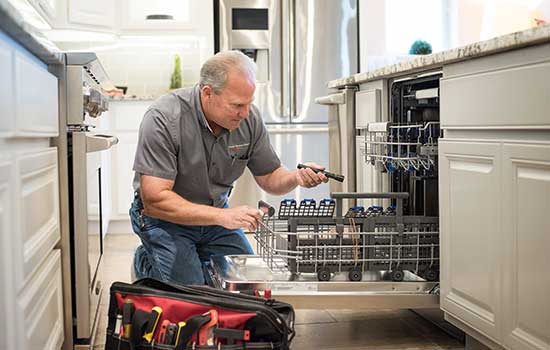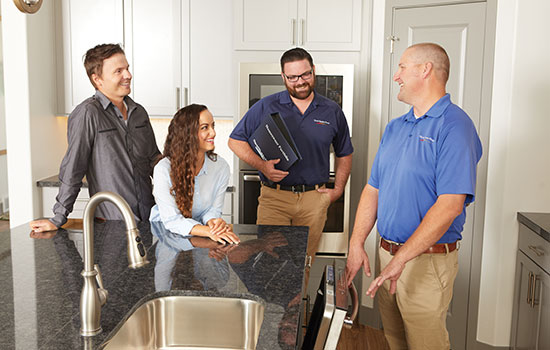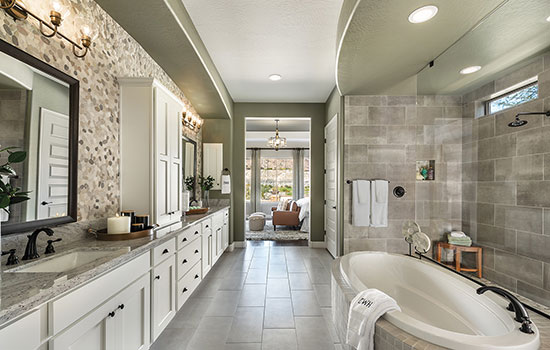Updated: May 4, 2023
Anticipating the Costs of Owning a Home
Explore this first-time Homebuyer’s guide to common home maintenance expenses to prepare your finances for homeownership
Buying a home can be a profoundly rewarding personal experience and a beneficial financial decision. The best way to ensure that you enjoy both of these lifestyle advantages to the fullest is to prepare for the responsibilities that are typically taken care of by a loved one or landlord during the pre-homeownership time of your life.
These expenses are separated into three types: Time-of-Purchase Expenses, Monthly Homeownership Expenses and Situational Expenses.

Time-of-Purchase Expenses
Understanding the costs that come with owning a home is an essential part of your homeownership plan. What expenses can you expect when signing on the dotted line?
Down Payment
This tends to be the single largest payment a homeowner will make and counts as one of the central factors for negotiating a home loan. The standard amount of a down payment for a traditional home loan is 20% of the agreed purchase price.
This amount can change based on loan type, such as with FHA loans or VA loans, or even adjusted with changes in closing costs.
Closing Costs
Closing costs are one-time fees charged by the lender that you pay when you sign the closing documents for your home purchase. The fees vary by state and lender, but are typically between 2 and 5 percent of the home’s purchase price.
These can include fees related to preparing and filing paperwork, pre-paying for homeowners insurance, refunding the previous owner for HOA dues, inspections and more. Some sellers may be willing to negotiate on closing costs as part of the purchase agreement.
Moving Expenses
Whether you’re packing up and lugging boxes yourself or paying a team to do it for you, there will be expenses associated with getting your furniture and possessions to your new home. Boxes, tape, packing material are a good start, but you still have to consider transportation.
If you’re hiring movers, be sure to comparison shop for a good price among moving companies with a solid reputation. There’s also a time-honored tradition of getting friends to help you move, in which case you’ll want to rent a moving truck and provide food and drinks enough for everyone. If you’re using a friend’s truck, it’s customary to pay for their gasoline.
Move-in Readiness Expenses
When purchasing an existing home, one thing you may need to be prepared for is repair and remediation costs necessary before or soon after moving into the home. This may include pest control, replacing major appliances, plumbing repairs, replacing flooring or drywall, or other expenses to get the home in livable condition.
Consider purchasing a new construction home from a top-quality home builder to avoid the nuisance and expenses of having to renovate an outdated or poorly maintained home.

These are the regularly-occurring costs of owning a home, which are typically paid on a monthly basis.
Monthly Homeownership Expenses
Mortgage Payments
A major part of a home loan is the “mortgage term,” which is the agreed upon amount of time for the Homebuyer to finish paying off the loan. The monthly mortgage payment is the basic unit of this repayment plan.
The amount of your monthly mortgage payment depends on the price of your home, down payment, interest rate and mortgage term. Some other expenses may be rolled into your mortgage through a process known as “escrow.”
Property Taxes
You will pay a percentage of your home’s assessed value in property taxes. These taxes fund local emergency services, public education, and road construction. This expense is often escrowed into your mortgage.
Be sure to ask your Real Estate Agent about the local property tax rates to help budget appropriately.
Homeowners Insurance
Your Homeowners Insurance premium is calculated based on the value of your home, where your home is located and the type of coverage you choose. Research the agencies and coverage types available in your area so you can make an informed decision and budget accordingly.

Homeowners Association Dues
Some communities feature amenities and deed restrictions to improve property values by making the community a great place to live. These communities require monthly dues from Homeowners to maintain amenities and uphold deed restrictions.
Common amenities include pools, parks, walking trails and gathering spaces. Deed restrictions typically prohibit residents from neglecting the condition of their home in a way that negatively impacts community safety and property values.
Ask your Real Estate Agent about HOAs in the communities you visit.
Utilities and Services
Before buying a home, you’ll want to learn about the types and costs of local utilities and services. These typically include bills for electricity and gas, water, trash pickup and internet.
Older homes can suffer from increased energy bills due to inferior insulation, outdated windows, poorly-sealed doors and aging heating and cooling systems. You should also be prepared for increased utility bills if watering the lawn is going to be a new part of your regular to-do list.
Landscaping
A home’s lawn and garden needs regular maintenance to stay healthy, look nice and prevent damage to the structure of the home from plant intrusion and ground erosion.
One popular option is hiring a professional to regularly keep up with your outdoor chores. This adds an extra bill to your monthly budget, but it can free up your time to pursue other goals and doesn’t require you to buy and store landscaping equipment.
Many homeowners find taking care of their own lawn and garden to be a highly rewarding and money-saving practice. Mowing the yard, trimming bushes, weeding the garden and keeping it all watered requires a modest time investment and can be a great way to get some sun and exercise while cutting out a monthly bill. You will need to purchase, store and maintain your own landscaping gear, but this investment can save you money in the long-term when paired with a bit of “sweat equity.”

Situational Expenses
It’s important to prepare for the routine costs and surprise expenses of keeping your home in good order. A major component of a home’s resale value comes from how well the home has been maintained. Investing in the maintenance of your home can pay dividends when it comes time to sell.
Some of these expenses may be fully or partially covered by your homeowners insurance or by a home warranty, such as the David Weekley Homes New Home Warranty.
Tree Trimming or Removal
As a home ages, the trees planted around it grow. Tree limbs can grow too close to your roof or your neighbor’s home and will need to be trimmed back. Some trees can pose risks of falling or damaging the foundation with intrusive roots and may need to be removed entirely.
In both cases, you’ll likely want to hire a professional crew to complete the work safely.
Roof Repairs and Replacement
When good materials are used and properly installed, a roof can last for decades. A new roof is often covered by a warranty.
Aging homes are especially prone to leaks from years of weathering the elements and may no longer be covered by the original roof warranty. If your roof isn’t covered by a warranty and the damage is due to regular wear and tear, it’ll be up to you to pay for repairs. Patching a leak here or there likely won’t cost too much, but you may need to replace the entire roof if the problem is more widespread.
Storm winds and hail can damage even new roofs, and may only be partially covered by your homeowners insurance depending on your policy elections. Going with the full replacement value choice on your homeowners insurance can be a prudent path to protect you from more extreme expenses in the event of a storm or accident.
Window Replacement
A neighbor’s errant baseball can cause an inconvenience and an unwelcome expense. A broken window can increase your energy bill and make it easier for pests to enter your home, so it’s important to get the window replaced as soon as possible.
Outdated windows are less energy efficient, block out less noise, and provide a lesser degree of privacy. If you’re moving into a house with outdated windows, one of your major renovation items to budget for may be upgrading the windows to reduce your monthly heating and cooling bill while improve your home’s resale value.

Plumbing Repairs
Frozen or rusted pipes, intrusive roots and inconvenient clogs can all result in variously expensive visits from a local plumber. Taking proper precautions, such as protecting your pipes during freezing weather, can help reduce the likelihood of incurring this type of expense.
Water Damage
A burst pipe, leaky roof or major storm can cause significant damage to floors, walls, ceilings, furniture, appliances and personal possessions. Depending on the type of insurance you have and the cause of the water damage, you may have to fully or partially pay to replace damaged carpentry, flooring, drywall, and insulation. It’s important to see to this type of maintenance as soon as possible to prevent mold and other unpleasant things from deteriorating your home’s livability and value.
Electrical Issues and Upgrades
Older homes may include outdating or even unsafe wiring, especially if a previous owner was a DIY electrician with more enthusiasm than know-how. Wiring can also be damaged by pests, such as attic-resident squirrels, or have suffered from improper maintenance to other elements of the home.
Updating your home’s electrical systems can be expensive, but can also save you money in the long-term with greater energy-efficiency, reduced risk of fire, better protection for your appliances against electrical surges and improved resale value.
Pest Control
Rodents, birds, reptiles, insects and arachnids can, for some horrible reason known only to them, decide to take up residence in your home. Most homeowners are able to enjoy their home with only the occasional spider incident.
Should you find yourself having to evict some icky intruders, you’ll likely want to hire a pest control professional to remove the current infestation. There may also be follow-up steps to take that can help make your home less inviting and more difficult to enter for uninvited visitors.
Termite Repairs
Termites are one of the most unpleasant types of pests that can take up residence in your house. Their taste for wood means these little bugs will actually eat your home, forcing you to pay for a specialized extermination process and possibly requiring the replacement of decorative, functional, or even structural carpentry in your home.
The United States Environmental Protection Agency has guidelines on how to prevent termites from setting up shop in your home, as well as how to inspect for them and regain control of the situation before they can cause any major damage.
Foundation Repairs
Invasive tree roots, soil erosion and fault lines can damage your foundation, which in turn can cause cosmetic and structural damage to your home. Proper landscaping can reduce the risk of foundation damage, but not eliminate it.

Appliance Repairs or Replacement
Eventually, that trusty dishwasher, refrigerator, oven, washer or dryer will break for good and need to be replaced. There are affordable replacements options for each of these types of appliances, but you may want to upgrade to a model that offers better features, improved energy efficiency and elevated style.
These types of upgrades can be easier to prepare and budget for. If you’re moving into an existing home, you’ll likely have purchased and installed many of these appliances as part of getting the home move-in ready. You can recognize which appliances are the oldest and most likely to need replacement in the near future.
A little window shopping and feature comparison can help you set a price range to save up for and even pre-empt an inconvenience by turning it into an exciting home upgrade project.
HVAC Repairs or Replacement
Losing air conditioning during the summer or heating during the winter can be inconvenient, unpleasant, and even downright dangerous during extreme weather events. It’s important to see to your HVAC system’s regular maintenance to prevent or delay expensive replacements and unpleasant wait in the meantime.
Even with good maintenance, and air conditioning unit will eventually need to be replaced. Some older homes may have outdated A/C systems that are more expensive to keep running, meaning that every day you keep your home comfortable using the old system will cost more than with a newer, more energy-efficient replacement.
That said, replacing major mechanical elements of your HVAC system can run up into the thousands, and even tens of thousands, of dollars. If you’re moving into an existing home with outdated heating and cooling, it will be prudent to begin saving up for a replacement as soon as you’re financially back on track after the move.
New construction homes built by reputable home builders will feature new, energy-efficient HVAC systems, which should be covered by a warranty.
Fence Repairs or Replacement
Wooden fences can last a surprisingly long time with occasional maintenance. Still, those wooden boards will deteriorate over time and eventually need to be replaced. Metal and alternative material fences can last longer, but are still subject to material degradation over time.
Replacing a fence can be a surprisingly complicated endeavor due to potential HOA restrictions, zoning laws, shared ownership with your neighbor, and matters of surveying the property lines.
If you’re moving into an existing home with a fence that looks the worse for wear, you may want to bring it up early in the process and get a head start on matter of zoning, property lines, inspections, and HOA rules while you’ll be dealing with all those topics, anyway.
Do your research and consider discussing the matter with your adjoining neighbors. Often, a neighbor will help pay for part of the replacement on an adjoining portion of a fence, but this isn’t always the case.
Replacing the Water Heater
It’s easy to forget that there’s an amazing piece of technology in your home that allows you to take a hot shower at a moment’s notice. That is, until there’s no hot water.
Regular maintenance can help improve the performance and lifespan of a water heater, but one day it may need to be replaced. New water heaters, such as those installed in new construction homes, generally offer greater energy efficiency and warranty coverage.
Replacing an old water heater isn’t cheap. Be prepared for a bill over $1,000, and well beyond that for larger or more advanced models.
Replacing the Carpet or Flooring
Daily use and changing trends means your flooring can get physically and stylistically worn out. You might not have the same taste for carpet or self-installed tiles as home’s previous owners or maybe it’s just time to upgrade to a more modern luxury vinyl.
You’ll likely want to hire professionals to remove the existing flooring and install the new material. While it’s often touted as a popular DIY project, inexperienced floor removal can damage the surface beneath. Improperly installed flooring is very noticeable and can diminish the return on your new flooring investment in addition to not looking as impressive as you’d envisioned.
The price of flooring is determined by the square foot, so the first step of creating your new flooring budget will be measuring the size of the rooms you want to resurface and begin looking at the types and costs of available flooring materials.

Kitchen and Bathroom Upgrades
The kitchen and bathroom are two of the most fixture-rich areas of the home, and are often subject to changing styles and preferences over the years. Replacing the cabinetry, countertops, faucets, sinks, tubs, showers and commodes are some of the most common types of home renovations.
These renovations can often be costly, but they can have a major impact on your home’s resale value and are considered worthy investments.
If you’re moving into an older home, chances are you’ve already picked out what elements need to be replaced. Budgeting for their replacement will involve prioritizing an order for renovations, shopping for replacement materials and finding reputable contractors to work with.
Consider the Benefits of Buying a New Construction Home
Moving into a new construction home still carries with it most of the time-of-purchase and monthly homeownership expenses, but without many of the situational expenses for many years to come.
A newly built home by David Weekley Homes with feature our innovative EnergySaver™ construction with all-new HVAC, appliances, flooring, cabinetry and fixtures. And all of this is covered by our industry-leading warranty.
Whether you choose a Quick Move-in Home with finishes selected by our interior design experts or select from our available homesites, floor plans and design options when you build from the ground up, you’ll enjoy the best in Design, Choice and Service from a home builder with more than 45 years of experience.
If you’re interested in exploring new homes available in our 19 markets across 13 states, contact our Internet Advisor for a quick chat to explore the best options for your new dream home.












